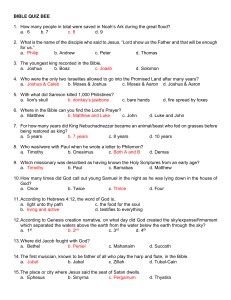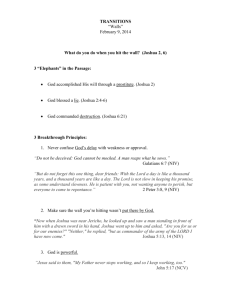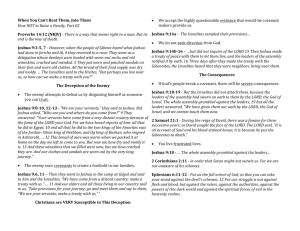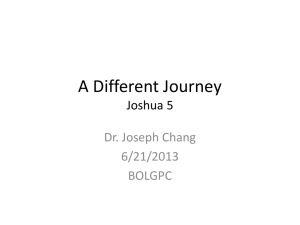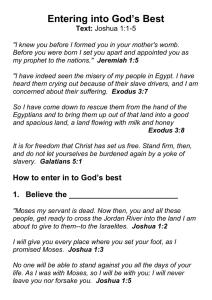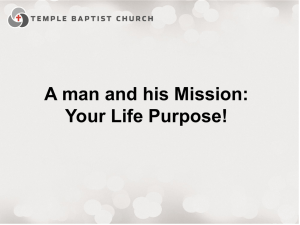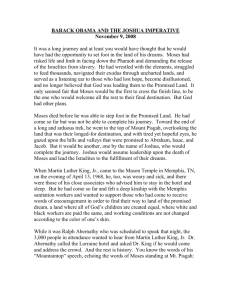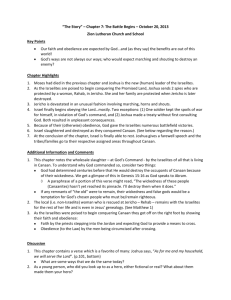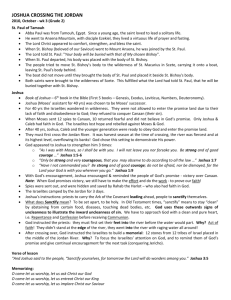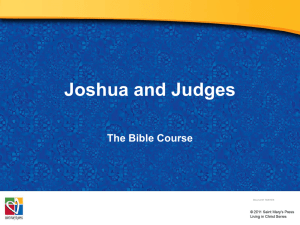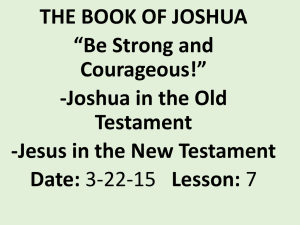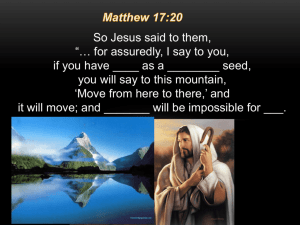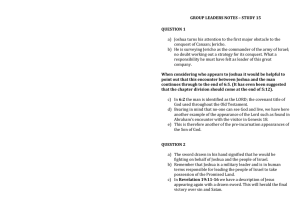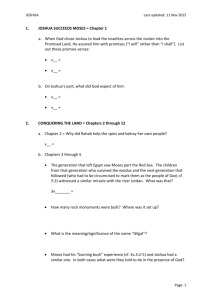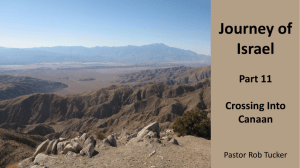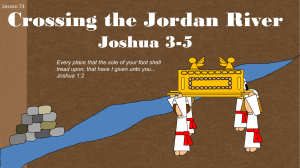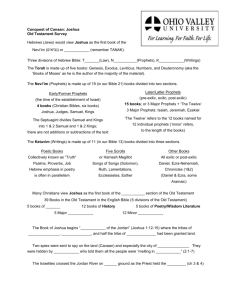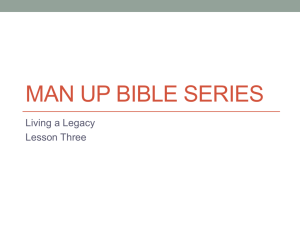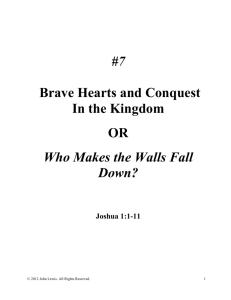Mathews, Stephen - ASSIGNMENT 3 – sec 02
advertisement
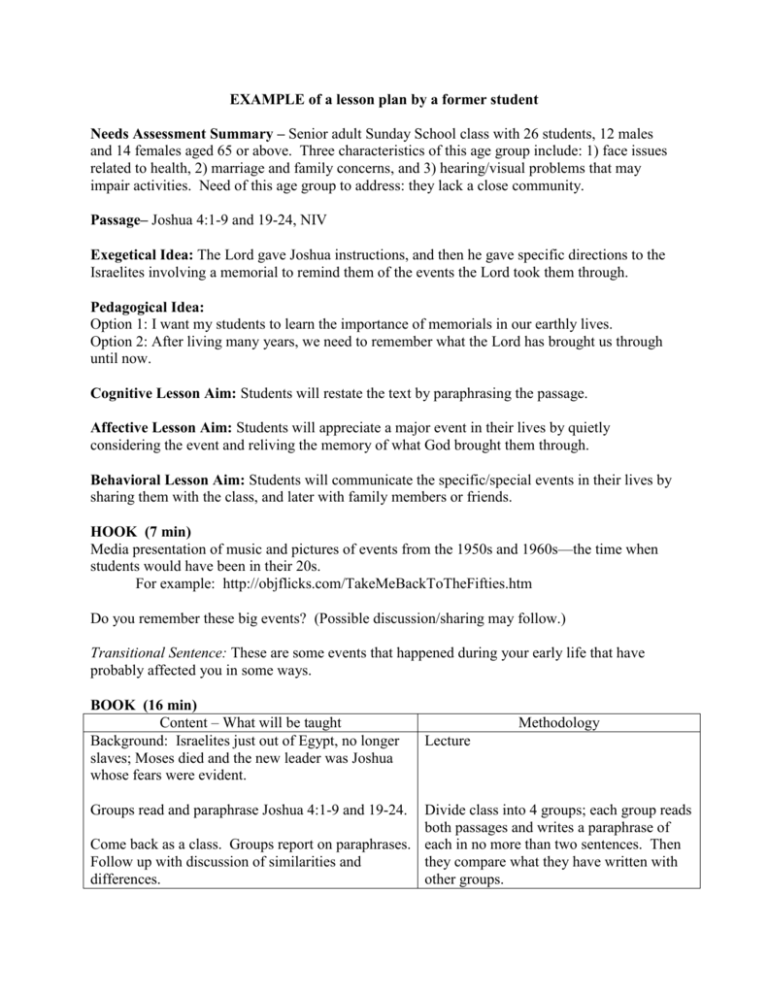
EXAMPLE of a lesson plan by a former student Needs Assessment Summary – Senior adult Sunday School class with 26 students, 12 males and 14 females aged 65 or above. Three characteristics of this age group include: 1) face issues related to health, 2) marriage and family concerns, and 3) hearing/visual problems that may impair activities. Need of this age group to address: they lack a close community. Passage– Joshua 4:1-9 and 19-24, NIV Exegetical Idea: The Lord gave Joshua instructions, and then he gave specific directions to the Israelites involving a memorial to remind them of the events the Lord took them through. Pedagogical Idea: Option 1: I want my students to learn the importance of memorials in our earthly lives. Option 2: After living many years, we need to remember what the Lord has brought us through until now. Cognitive Lesson Aim: Students will restate the text by paraphrasing the passage. Affective Lesson Aim: Students will appreciate a major event in their lives by quietly considering the event and reliving the memory of what God brought them through. Behavioral Lesson Aim: Students will communicate the specific/special events in their lives by sharing them with the class, and later with family members or friends. HOOK (7 min) Media presentation of music and pictures of events from the 1950s and 1960s—the time when students would have been in their 20s. For example: http://objflicks.com/TakeMeBackToTheFifties.htm Do you remember these big events? (Possible discussion/sharing may follow.) Transitional Sentence: These are some events that happened during your early life that have probably affected you in some ways. BOOK (16 min) Content – What will be taught Background: Israelites just out of Egypt, no longer slaves; Moses died and the new leader was Joshua whose fears were evident. Groups read and paraphrase Joshua 4:1-9 and 19-24. Methodology Lecture Divide class into 4 groups; each group reads both passages and writes a paraphrase of Come back as a class. Groups report on paraphrases. each in no more than two sentences. Then Follow up with discussion of similarities and they compare what they have written with differences. other groups. Teacher concludes with the following points: 1) This is a historical narrative. Lecture—make concluding comments 2) The importance of memorials is to help us remember events in which God has worked. 3) It is important to ask the question of meaning (v. 21) and to answer the question. 4) Purpose of God in this event is found in v. 24— to know God’s power and to fear Him. Transitional Sentence: The journey out of Egypt was a big event for the Israelites; like them, we have had significant events happen in our lives. LOOK (10 min) Circle Response: Think of the top two biggest events in your life. Select one and share it. How did this event affect your life? How do you see God in this event? When was the last time you remembered this event? Story telling- Teacher shares with students one of the biggest events in life so far, i.e. how God provided first job. Transitional Sentence: It seems that marriage, family, etc. was the main event in most of your lives. Just like Joshua gave the Israelites a reminder of their event, you can have a reminder to share with your family/grandkids/descendants. TOOK (7 min) Having shared and thought about this event, write s short statement or draw a picture that reminds you to share this with a friend or a grandchild this week. You may want to think of this question as you draw or write your response: “How did this event grow me in my understanding of God or my fear of God? Distribute a stone to each student; explain that this is a little reminder for them to keep and to have with their drawing of the big event they considered today that God had planned in their lives. Methods used in lesson: Lecture Small Groups Circle Response/Discussion Story Telling Creative Art/Writing
